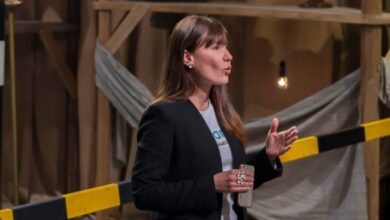Arukay, what is it and why is it important?
This STEM teaching system made Ana Victoria Ricaurte, head of Arukay, the most dynamic and innovative entrepreneur in the region.

The Woman Post | Luisa Fernanda Báez Toro
Listen to this article
Ana Victoria Ricaurte, recognized this year as the most dynamic and innovative entrepreneur in the region, creating global business in STEM, spoke to The Woman Post.
Arukay, as Ricaurte told IDB in an interview, is a curriculum learning system for schools, for students from first grade to 12th grade that teaches computational thinking and coding through STEAM challenges and projects (Science, Technology, Engineering, Arts and Math).
In an interview with the woman post, Ana Victoria Ricaurte, known as “Vicky”, told us about her company, its importance and how it is an entrepreneur's life.
The Woman Post: How do you teach coding to children?
Ana Victoria Ricaurte: Basically we have a learning system that teaches computational thinking and teaches programming through STEM challenges and projects that are related to challenges in science, technology, engineering, arts, and mathematics.
This learning system is acquired by a school and the school acquires three services with Arukay: teacher training, the content where we give them the curriculum grade by grade and the teaching guide given to each teacher. Also, we have a learning platform where students and teachers enter to take the contents.
TWP: Why are you doing this?
AVR: We are doing it because learning computational thinking today is almost as important as learning to add, subtract, read or write. It is a basic skill that you have to have if you want to be relevant in the digital economy. If you check out the 10 largest companies in the world, they are being revolutionized by technology or are already technology-based. What we are doing is preparing digital natives to have the necessary skills to be digital-based entrepreneurs or digital-based employees.
Also read: Teens must 'get smart' about social media
The deal is that 65% of students who start first grade will go to work in jobs that do not exist nowadays. However, 80% of those future jobs will require programming skills the challenge is that in the market only one in ten schools in the world teaches how to program.
We know that this skill is very important for everyone. Let's say that we come from a generation that thinks that computational thinking is for engineers and that is true but today, with the fourth industrial revolution and with the digital transformation going on, learning to program and learn computational thinking is not only for engineers, it is for everyone given that current jobs and that trend will not stop.
TWP: What tools are you using?
AVR: We have eleven different programming languages and each year the child learns a different programming language. We have junior scratch, scratch, Minecraft, javascript, HTML, artificial intelligence, blockchain, among others.
The way we teach it is very different since we see programming not as content but as a language, a language that today is known as the language of the future, one that will allow humans to communicate with each other but also with machines.
TWP: Has the entrepreneurship path been difficult?
AVR: The path of entrepreneurship is not a rosy path, on the contrary, it requires much more risk since you do not have a tangible compensation, it requires many more hours of work, you are always thinking about how to grow your company. Then, the world of entrepreneurship requires much more effort and a different mentality, where all the time you are testing in the market and according to its response you go and correct the processes in each of the areas of your business.
Basically I have been doing it for nine and a half years, I have created five companies and it has been a path that for me he undertakes two things, the passion for what you are doing and let's say discipline, resilience and effort. An entrepreneur cannot undertake something he does not like since it is already difficult enough to do something you do not like.
TWP: Have you found any closed doors for being a woman?
AVR: In my case, I have not found closed doors for being a woman, on the contrary. I believe that working in education and technology and being a woman is an advantage, I have never felt exclusion for gender issues. However, technology is a world dominated by men and is a world in which one of the topics I work on is how to encourage girls and women to innovate digitally solving a global problem.
Also, our system works the same for boys and girls, we don't see a difference in learning or results.
TWP: What changes have you noticed in the people you are teaching?
AVR: The changes that I have noticed are tangible, what we teach is basically reflected in the child's development of algorithmic thinking, mathematical logic, and programming logic and we have just received an incentive from the market: the 2020 or 2021 Pisa tests are going to start evaluating computational thinking, so that is fantastic since schools are going to start assessing this topic.





